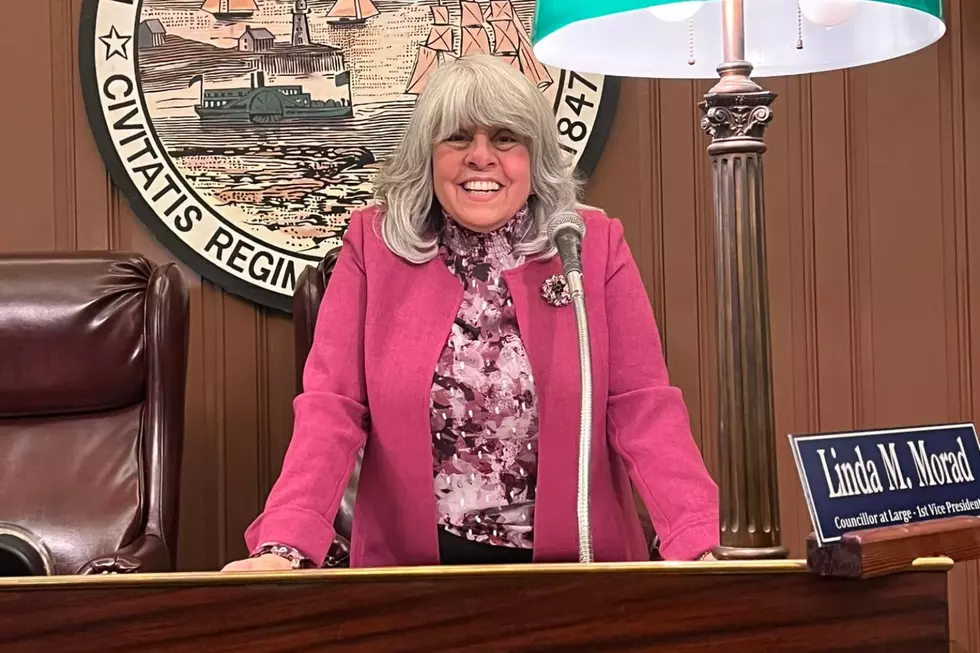
New Bedford Council President on CPA Veto: ‘Does This Mayor Think He Knows Better Than the People?’
NEW BEDFORD (WBSM) — City Council President Linda Morad has issued an official response to Mayor Jon Mitchell’s veto of a non-binding ballot question that would ask residents of New Bedford if they wished to repeal the Community Preservation Act.
“Listening to the will of the residents of New Bedford is a fundamental role of any elected leader, and it is the reason why I support the effort to place a non-binding question on the 2023 City of New Bedford ballot regarding the Community Preservation Act,” Morad said in a press release.
Morad is the councilor who proposed putting the question on the November 2023 ballot, after stating she had heard from constituents looking for tax relief and not wanting to pay the 1.5 percent surcharge on their property tax assessment.

The Community Preservation Act is a Massachusetts state law that allows municipalities to charge a surcharge of up to three percent on property tax assessments to collect funds that must be used for preserving open space and historic sites, creating affordable housing, and developing outdoor recreational facilities. New Bedford voters passed participation in the CPA on the November 2014 municipal ballot.
It also allows for municipalities to leverage additional funding from private foundations, state and federal governments and other sources for these projects. According to a City of New Bedford press release from earlier this month, there have been 79 CPA grants totaling $8.4 million in CPA funding since FY18 in New Bedford, with an additional $7.2 million in funding leveraged from those outside sources.
In her statement, Morad stated that back in 2014 the CPA item “narrowly passed 49 percent in favor, 41 percent opposed, with 10 percent of those that cast ballots leaving the question blank,” she wrote.
“With such a small voter turnout, the unknown will of the 10 percent of residents casting blank ballots leaves the overall results in question,” she said.
Read Council President Morad's Complete Statement
Morad pointed to rising property tax bills as well as an increase in water and sewer rates as the reason to look at eliminating the annual 1.5 percent CPA surcharge.
“Under (the Mitchell Administration)’s continual budget increases the average property bill in New Bedford has increased 61 percent since 2013, resulting in the corresponding increase in the annual CPA charge,” Morad said. “The dramatic increase in property tax coupled with the increasing water and sewer rates in New Bedford and the overall increases in inflation affecting the basic cost of living has resulted in our residents looking for relief and raising concerns about the CPA assessment.”
“We as elected leaders, despite our personal opinions, have a responsibility to give the people a chance to once again have their voices heard regarding the annual CPA surcharge,” she said.
In the strongly-worded four-page letter that accompanied his veto on the CPA question, a non-binding question about reverting the mayoral term from four years back to two, and a non-binding question proposing rent stabilization in the city, Mitchell said “the CPA has been a boon to New Bedford.”
“It has enabled the City to complete a total of $15.6 million in preservation and open space projects, of which the City leveraged a total of $7.2 million of state and private funds – by any standard, a healthy return on investment,” he wrote.
Read Mayor Mitchell's Veto Letter
Mitchell also wrote that there had been “no sign of public demand for action” on the issues raised by the ballot questions, and called into question the way the council deliberated putting the questions on the ballot, saying it “skipped the committee process.”
“They raise complex policy questions for which the public would reasonably expect a thorough quantification of their likely impact, a review of relevant policy literature, the input of the administration, and a robust public debate of alternatives,” he wrote. “The council failed to take any of these basic steps of legislative deliberation.”
In her response, Morad stated that when the CPA was proposed in 2013, “there was no ‘sign of public demand for action’ on the CPA, nor was there ‘a review of relevant policy literature’ or ‘a robust public debate of alternatives,’” she said. “Just the New Bedford City Council doing the fundamental job of listening to the will of the residents and placing the CPA question on the ballot for consideration of the residents.”
“I do not recall a four-page veto document being issued by the mayor on that vote,” she wrote. “Fast forward 10 years and I find it interesting that this administration is now so strongly opposed to listening to the voice of the residents once again regarding the future of the CPA.”
“Why would an elected representative be so vehemently opposed to a non-binding ballot question that seeks input from the public on a specific issue?” she wrote. “Does this mayor think he knows better than the people that elected him to represent them?”
LOOK: The 25 least expensive states to live in
LOOK: The oldest cities in America
More From WBSM-AM/AM 1420









